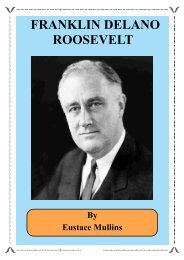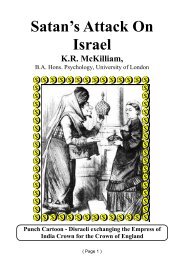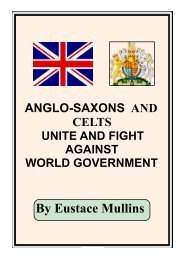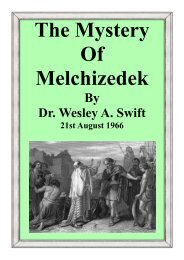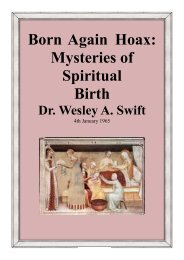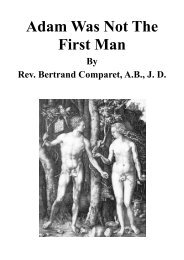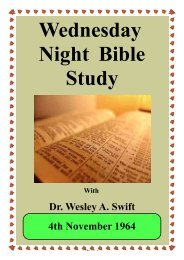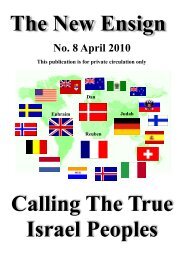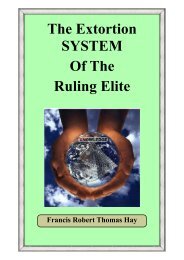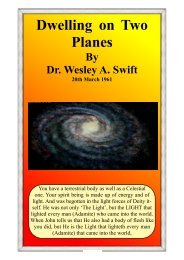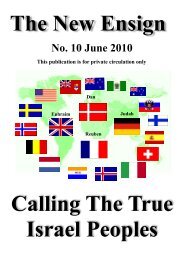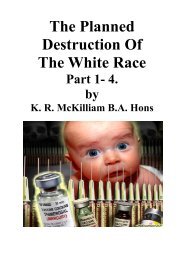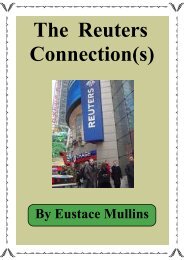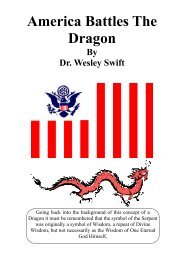Curse of Cannan - The New Ensign
Curse of Cannan - The New Ensign
Curse of Cannan - The New Ensign
Create successful ePaper yourself
Turn your PDF publications into a flip-book with our unique Google optimized e-Paper software.
the Dukes <strong>of</strong> Bedford, including Bertrand Russell, the most famous humanist <strong>of</strong> the twentieth<br />
century. <strong>The</strong> second Baron was born in Rome while his father was serving there; he became<br />
president <strong>of</strong> the Oxford Union; he married the daughter <strong>of</strong> the Earl <strong>of</strong> Beauchamp (her father<br />
held the title <strong>of</strong> Lord <strong>of</strong> the Cinque Ports); his wife was Lady-in-Waiting to Queen Mary; he was<br />
also a brother-in-law <strong>of</strong> the Duke <strong>of</strong> Westminster; joined the Order <strong>of</strong> St. John <strong>of</strong> Jerusalem, and<br />
served as Grand Master <strong>of</strong> the lodge which had been formed at the Bank <strong>of</strong> England, Lodge No.<br />
263. He wrote the' 'History <strong>of</strong> the Bank <strong>of</strong> England Lodge" and was appointed head <strong>of</strong> the Masons<br />
<strong>of</strong> Madras, India, before becoming Grand Master <strong>of</strong> England; he served as private secretary to<br />
Hon. J. Chamberlain, Governor <strong>of</strong> Madras and Viceroy <strong>of</strong> India.<br />
<strong>The</strong> backgrounds <strong>of</strong> these Grand Masters prove that English Freemasonry has always had access<br />
to the highest circles <strong>of</strong> government; Disraeli, a Freemason, became Prime Minister; he referred<br />
to "determined men <strong>of</strong> Masonry," meaning those Masons who were assigned to carry out the<br />
crucial tasks <strong>of</strong> assassination.<br />
One <strong>of</strong> the Canaanites who became renowned as a leading English economist, and still enjoys<br />
wide influence in the United States, was David Ricardo (1772-1823), the third son <strong>of</strong> Abraham<br />
Israel, who was a substantial member <strong>of</strong> the Jewish community in Amsterdam. Israel emigrated<br />
to Lon~ don with William III and later became one <strong>of</strong> the wealthiest members <strong>of</strong> the London<br />
Stock Exchange, where he worked closely with his fellow emigres. His son, David, became an<br />
intimate friend <strong>of</strong> Lord Nathan Mayer Rothschild, speculating heavily in government securities<br />
on advice <strong>of</strong> Rothschild. Together, they pr<strong>of</strong>ited enormously from the financial coup resulting<br />
from early news about the outcome <strong>of</strong> the Battle <strong>of</strong> Waterloo. David Israel, now known as David<br />
Ricardo, began to write economic dicta intended to become the final word on how much the<br />
working class should be paid. He developed a formula which became known as "the subsistence<br />
wage," dictating that the worker should never receive more than the bare minimum needed for<br />
his subsistence. If his wages were to be increased, the government was charged to take care <strong>of</strong><br />
it by promptly increasing his taxes (does this sound familiar to any Americans?). <strong>The</strong> Canaanites<br />
in America developed a new twist with the withholding tax, which insured that the worker would<br />
never receive his wages in the first place; he would only receive a mutilated portion, from which<br />
the Canaanites had already deducted "their" portion. Ricardo's dictum, which also became known<br />
as "the iron law <strong>of</strong> wages," iron meaning that under no circumstances would the worker ever be<br />
the beneficiary <strong>of</strong> any outburst <strong>of</strong> generosity and be allowed even a small increase, when Rita<br />
Ricardo-Campbell, wife <strong>of</strong> the director <strong>of</strong> the Hoover Institution, and a direct descendant <strong>of</strong><br />
David Ricardo, came to Washington as a key member <strong>of</strong> Reagan's staff, the Reagan anti-<br />
Communist, humanitarian Revolution. She became Reagan's advisor on Social Security payments<br />
and pensions. Ricardo's economic theories on wages and labor had also been enthusiastically<br />
received by Karl Marx, who adopted them as the guidelines by which the slave workers <strong>of</strong> Soviet<br />
Russia are ruled today.<br />
Stephen Knight's book, "<strong>The</strong> Brotherhood," reveals many interesting details about English<br />
Freemasonry. He points out that the Unlawful Societies Act <strong>of</strong> 1799 required that Freemasons<br />
could hold meetings only if the names <strong>of</strong> the members were submitted to the local Clerks <strong>of</strong> the<br />
Peace; this requirement has never been complied with. Knight says that Queen Elizabeth is the<br />
present Grand Patroness <strong>of</strong> English Freemasonry. One <strong>of</strong> his most startling revelations is the<br />
information that from fifty to seventy per cent <strong>of</strong> all English judges are Freemasons. Lawyers<br />
find that they must join the Freemasons if they expect to get any clients. "<strong>The</strong> Law Society is<br />
one <strong>of</strong> the most masonic institutions in the world," notes King. Ninety per cent <strong>of</strong> its members<br />
are Masons. This creates great inequities, because the Law Society is the final judge RS to who<br />
will receive legal aid and who will be denied it. A non-Mason has no chance <strong>of</strong> receiving legal<br />
aid in a suit against a Mason. This is, typical <strong>of</strong> the Will <strong>of</strong> Canaan; the secret conspiracy against<br />
all who are not members <strong>of</strong> the tribe.<br />
<strong>The</strong> Masonic conspiracy which casts a pall over legal procedures in England is but one<br />
manifestation <strong>of</strong> its sinister influence. During the Elizabethan Age, the fascination with the occult<br />
( Page 52)



